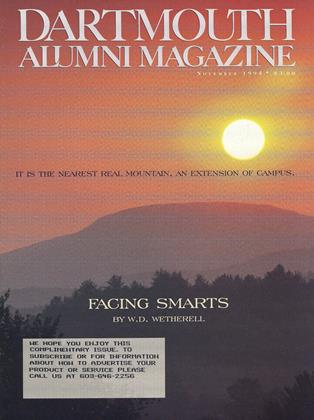1771
Dartmouth's first Commencement includes an anthem written by two seniors.
1807
Music buffs form The Handel Society "to promote true and genuine music and discountenance trifling unfinished pieces."
1838
The Hanover clergy petitions the Dartmouth Trustees to abolish the tradition "of procuring a Band of Instrumental music from abroad at a great and unnecessary expense."
1876
Henry Waite assembles a collection of the nation's most popular college songs. In the chapter "Songs of Dartmouth" there are ten entries, half of which celebrate the burning of math books.
1899
Hums begins as a serious singing event.
1901
President Tucker's plan for curricular expansion includes a new music department.
1926
The official alma mater is "Song of Dartmouth," at the end of which (and for no obvious reason) men are supposed to spell T-I- G-R.
1937
Students interested in the works of Sergey Prokofiev form the Prokofieff Society. The composer is named honorary president.
1968
In a song composed for their 50th reunion the class of 1918 take a poke at the Vietnam era by singing,
In our day Dartmouth was an Indian institution (Though they tore up their draft cards in the Revolution) War painted hippies are still around to haunt us, And we'll ne'er forget our Prom Girl, Pocohontas.
1973
Work begins on a computer program to teach music. The program evolves into the Synclavier, a.digital music maker that revolutionizes the music industry.
1985
Dartmouth students learn to sing an antiphon transcribed from a manuscript fragment housed in Baker Library. Scholars believe the work has not been heard for at least 900 years.
1988
Dartmouth grad student John Scott '81 creates a database of the Grateful Dead's concerts. The two songs Deadheads hear most often are "Me and My Uncle" and "Sugar Magnolia."
Mater's musicians are always noteworthy.
 View Full Issue
View Full Issue
More From This Issue
-
 Feature
FeatureLooking for Mister Right Stuff
November 1995 By Jane Hodges '92 -
 Feature
FeatureNUMBER 3
November 1995 By Brooks Clark '78 -
 Cover Story
Cover StoryFACING SMARTS
November 1995 By W.D.Wetherell -
 Feature
FeaturePeter Smith's Tribal Links
November 1995 By Robert Sullivan '75 -
 Feature
FeatureSentimental Sap
November 1995 By Robert K. Nutt '49 -
 Article
ArticleDr. Wheelock's Journal
November 1995 By "E. Wheelock"







